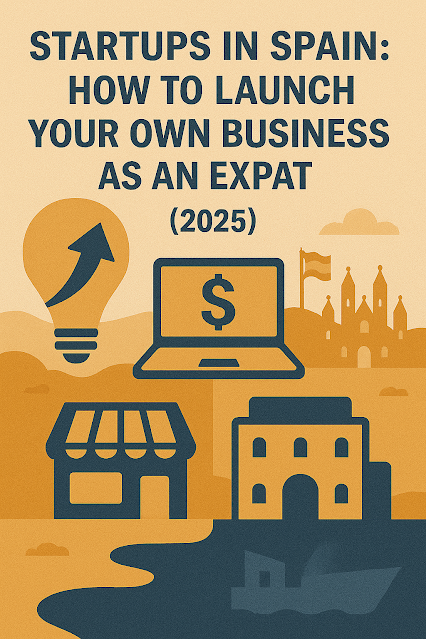Start a Business in Spain: Spain is quickly becoming a hotspot for international entrepreneurs, thanks to a growing startup ecosystem, favorable tax regimes, and a vibrant quality of life. If you’re an expat considering launching a business in Spain, understanding the legal, administrative, and financial steps involved is key to success.
🚀 Why Start a Business in Spain?
Spain offers several advantages for foreign entrepreneurs:
- Thriving startup hubs like Barcelona, Madrid, and Valencia
- Strong government support through grants and incubators
- Affordable living and talent pool
- Inclusion in EU funding opportunities
If you’re already planning your move, explore our guide for moving to Spain from the UK, Canada or Australia.
📋 Legal Requirements: Business Structures
Foreigners can legally start a business in Spain, but you must first choose the appropriate legal structure:
- Autónomo (Freelancer): Ideal for solo entrepreneurs or consultants. Low setup costs but high social security contributions.
- Sociedad Limitada (SL): Equivalent to an LLC. Requires a minimum capital of €3,000 and formal registration.
- Sociedad Anónima (SA): Used by larger businesses and corporations. Requires higher initial capital (€60,000).
For freelancers, check our complete guide to freelancing in Spain.
📑 Step-by-Step Process to Launch Your Startup
- Get your NIE (Foreigner ID Number)
- Choose your business structure
- Register the business name (Registro Mercantil Central)
- Open a business bank account and deposit initial capital
- Draft articles of association
- Sign deed of incorporation before a notary
- Register for taxes with the AEAT (Agencia Tributaria)
- Register for social security (Seguridad Social)
💡 Startup Ecosystem in Spain
Spain is home to hundreds of accelerators and incubators. Some of the most popular include:
- Barcelona Activa
- Wayra (Telefónica)
- SeedRocket
- Lanzadera
Startups in Spain also benefit from co-working spaces, government grants, and tax incentives under the Startups Law (Ley de Startups) introduced in 2023.
📊 Taxes and Financial Obligations
Startups benefit from tax breaks, but you should be aware of:
- CIT (Corporate Income Tax): Reduced 15% for new companies in the first two years of profitability
- VAT (IVA): Standard rate of 21% on most goods and services
- Social Security Contributions: Mandatory for business owners and employees
🌍 Can Non-EU Expats Start a Business?
Yes, but you’ll need the right visa. Spain offers a Digital Nomad Visa and Non-Lucrative Visa, depending on your income and business activity. If you’re launching a startup, consider applying for a Self-Employed Work Visa.
📈 Resources for Expats Starting a Business
Here are some helpful websites:
- Emprendedores.es – Spain’s top entrepreneurship magazine
- ICEX – Official Spanish trade and investment agency
- Barcelona Activa – Startup support and guidance
🧭 Final Thoughts
Spain is not just a place to enjoy life—it’s also a solid base to launch and scale your business. With the right preparation and legal support, expats can thrive in the Spanish startup ecosystem.
Explore our full section on Work & Business in Spain and don’t miss our in-depth article on Digital Nomad Visas.
